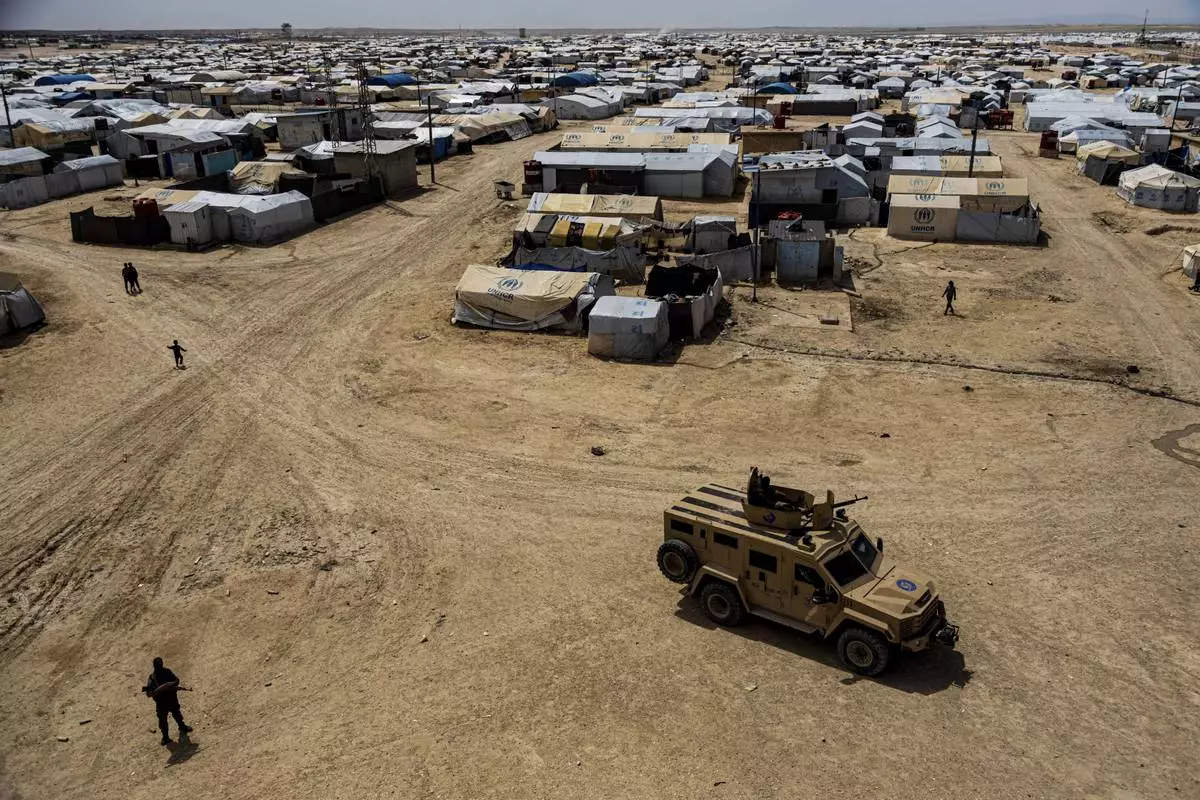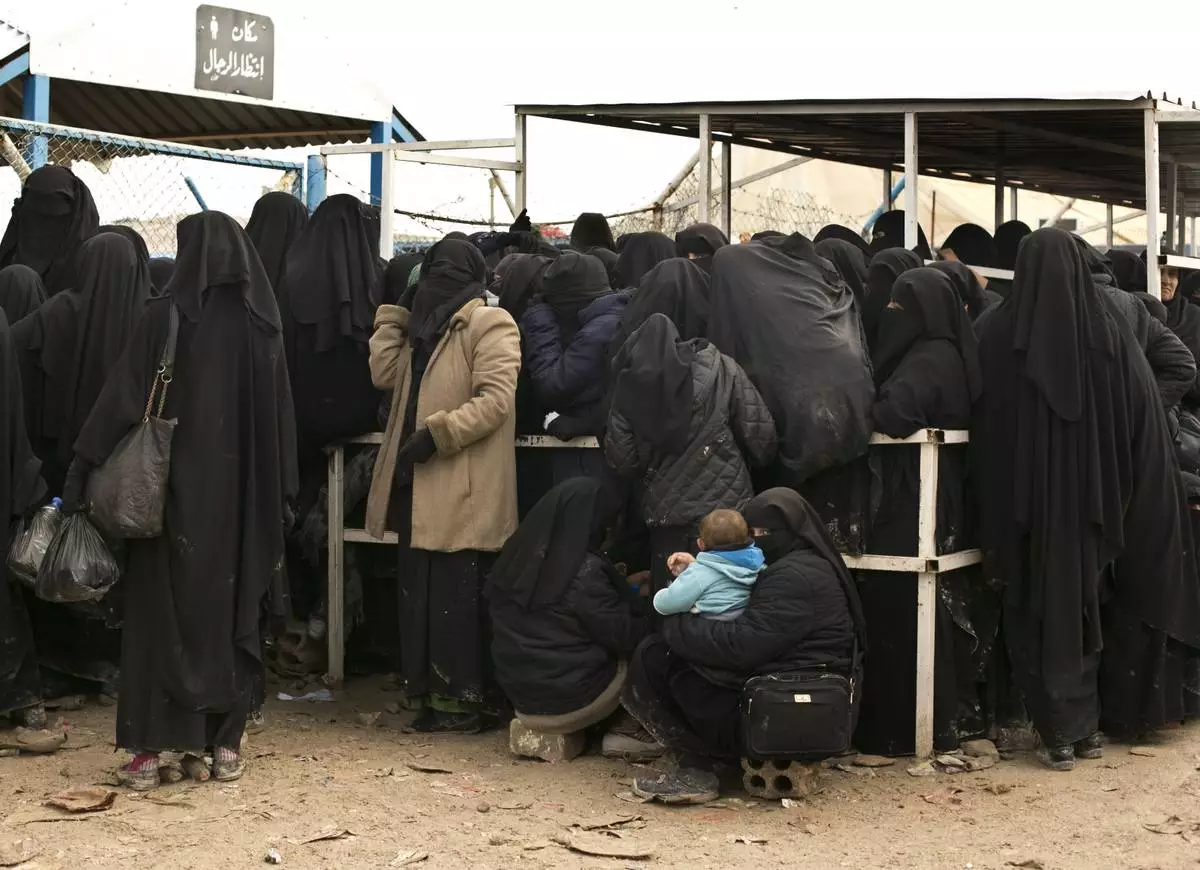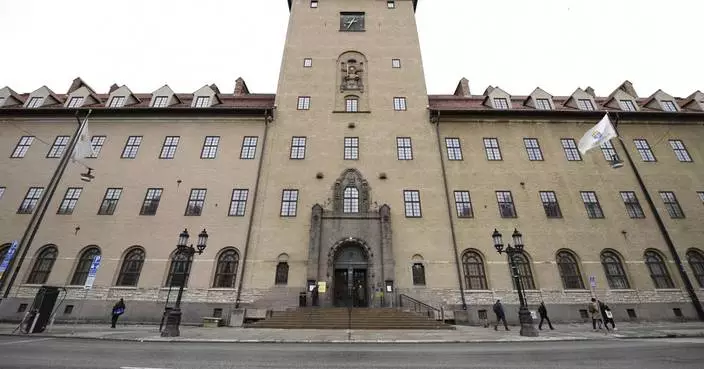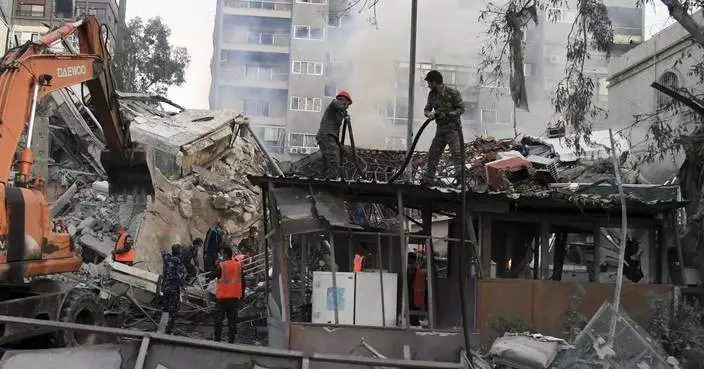Syrian government forces pressed ahead Monday with a new military assault on the country's last rebel stronghold that began last week. The offensive has triggered a mass exodus of civilians fleeing to safer areas near the Turkish border.
Under the cover of airstrikes and heavy shelling, Syrian troops have been pushing into the northwestern province of Idlib toward a major rebel-held town, Maaret al-Numan. The town sits on a key highway linking the capital Damascus with the northern city of Aleppo, Syria's largest.
The immediate goal of Syrian President Bashar Assad's forces appeared to be reopening the strategic highway, which has been closed by the rebels since 2012.

A man waves to a photographer as civilians ride in a truck as they flee Maaret al-Numan, Syria, ahead of a government offensive, Monday, Dec. 23, 2019. (AP PhotoGhaith al-Sayed)
Idlib province is dominated by al-Qaida-linked militants. It's also home to 3 million civilians, and the United Nations has warned of the growing risk of a humanitarian catastrophe along the Turkish border.
Residents of villages and towns in southern parts of Idlib province have been fleeing with their belongings in trucks, cars and on motorcycles.
The government's ground offensive resumed last week after the collapse of a cease-fire, in place since the end of August.

Civilians ride in a truck as they flee Maaret al-Numan, Syria, ahead of a government offensive, Monday, Dec. 23, 2019. (AP PhotoGhaith al-Sayed)
Before this latest bout of violence, the U.N. reported that some 60,000 Idlib residents had already been displaced since the government's bombing campaign began late last month.
The pro-government Al-Watan newspaper said Syrian troops were a few kilometers (miles) away from Maaret al-Numan, adding that the town “might surrender to the army without fighting.”
The opposition's Syrian Civil Defense, also known as the White Helmets, said Maaret al-Numan and the nearby town of Sarqeb were almost empty after tens of thousands of civilians left to escape heavy aerial and ground bombardment.

A man carries household goods on a motorbike while fleeing Maaret al-Numan, Syria, ahead of a government offensive, Monday, Dec. 23, 2019. (AP PhotoGhaith al-Sayed)
“As you can see the destruction is massive. Residents were forced to flee this area,” said a member of the White Helmets in a video as he walked through Maaret al-Numan. “They had to choose between death or fleeing to the unknown further north.”
Syrian troops have also nearly surrounded a Turkish observation post near the village of Surman in Idlib province, according to Al-Watan and the Britain-based Syrian Observatory for Human Rights, an opposition war monitor.
Turkey is a strong backer of some rebel fighters, and has 12 observation posts in northwestern Syria as part of an agreement. The deal was brokered last year along with Russia, one of Assad's main backers.

A man carries household goods on a motorbike while fleeing Maaret al-Numan, Syria, ahead of a government offensive, Monday, Dec. 23, 2019. (AP PhotoGhaith al-Sayed)
The Observatory, which has a network of activists in Syria, said government troops have captured approximately 35 villages and hamlets near Maaret al-Numan in the past few days.
Also Monday, a vehicle rigged with explosives blew up in a market in a northern Syrian town controlled by Turkey-backed opposition fighters, killing five people and wounding others, state media and opposition activists said.
State news agency SANA said the blast occurred in the village of Suluk near the Turkish border, putting the death toll at five people and reporting that several more were injured.
A similar death toll was also given by the Turkey-based Syrian National Coalition and the Observatory, which also said 20 people were wounded.
Suluk is near the Syrian border town of Tal Abyad in Raqqa province. Turkish troops and Turkey-backed fighters captured Tal Abyad and Suluk from Kurdish-led fighters in October. Turkey's invasion of northeastern Syria pushed back Syrian Kurdish fighters from some border areas.
Explosions in north Syria areas controlled by Turkey-backed opposition fighters killed scores of people in recent weeks.
Turkey blames Syrian Kurdish fighters for these attacks, a claim that the Kurds deny.
BEIRUT (AP) — Amnesty International said Wednesday it has documented widespread abuses, including torture and deprivation of medical care, in detention facilities holding thousands of suspected Islamic State members and their relatives in northeast Syria.
The centers and camps hold about 56,000 people — the majority of them children and teens — and are run by local authorities affiliated with the U.S.-backed, Kurdish-led Syrian Democratic Forces. The SDF and its allies, including U.S.-led coalition forces, defeated the Islamic State group in Syria in 2019, ending its self-proclaimed Islamic “caliphate” that had ruled over a large swath of territory straddling Iraq and Syria.
What to do with the suspected IS fighters and their families has become an intractable issue. Many countries whose citizens traveled to Syria to join IS have been reluctant to repatriate them, as have local communities in Syria.
"People held in this system are facing large-scale violations of their rights, some of which amount to war crimes,” Nicolette Waldman, Amnesty’s senior crisis advisor, told journalists.
The United States is also responsible for the alleged violations because it played a key role in establishing and maintaining the detention system, providing hundreds of millions of dollars to the SDF and affiliated forces and regularly interrogating detainees, Waldman said.
The human rights group interviewed 126 people accused of IS affiliation currently or formerly detained, along with representatives of the local administration and aid workers.
The Amnesty report said the vast majority of detainees are being held “indefinitely, without charge or trial, in violation of international human rights law and international humanitarian law,” while those who have been tried were, in many cases, convicted on the basis of confessions extracted under torture.
The alleged abuses include “beating, stress positions, drowning, electric shocks and gender-based violence,” including a male detainee who said he and others had been sodomized with broomsticks by guards, the report said. Detainees were also deprived of food, water and medical care and subjected to extreme cold and heat in overcrowded cells, with some allegedly dying of suffocation, it said.
The report added that many of the approximately 14,500 women and 30,000 children held had been victims of human trafficking, including women who were forced to marry IS fighters and minors who were forcibly recruited by the group, and that local authorities had failed to set up a “mechanism to identify trafficking victims” and protect them.
The report also criticized the practice of forcibly separating adolescent boys — some as young as 11 or 12 — from their mothers and placing them in rehabilitation centers indefinitely.
Amnesty called on local authorities, the U.S. government and other allies to bring the detention system into compliance with international law and urged the United Nations to work with them to establish a screening process to release all who are not “reasonably suspected” of having committed a serious crime.
The Autonomous Authorities of the North and East Syria Region, the civilian administration affiliated with the SDF, wrote in response to the Amnesty findings that it had not received any official complaints regarding torture in detention facilities and “if this happened, they are individual acts.”
The administration said it would take action against employees who committed violations if evidence is provided. It denied allegations that inmates were deprived of food, water and medical care. It acknowledged overcrowding in the facilities, which it attributed to lack of financial resources to secure larger centers.
The local authorities took issue with the allegation that people were arbitrarily detained, asserting that most detainees “are members of a terrorist organization and were arrested during the battles" and that many had committed crimes against humanity and war crimes.
The U.S. State Department said in its own response that “we share many of (Amnesty’s) concerns” and it has been working to address them. It called on the international community to “aid local entities’ management of these challenges” and for countries with citizens held in detention in Syria to repatriate them.
Waldman said she believes Washington "very likely knew about these poor conditions from the beginning."
She added: “We think that it may not be the case that they are doing everything they can. They need to accept a much greater responsibility, especially since they played such a key role in establishing the situation in the first place."

FILE - Kurdish forces patrol al-Hol camp, which houses families of members of the Islamic State group in Hasakeh province, Syria, on April 19, 2023. Amnesty International said Wednesday, April 17, 2024 it has documented widespread abuses, including torture and deprivation of medical care, in detention facilities holding thousands of suspected Islamic State members and their relatives in northeast Syria. (AP Photo/Baderkhan Ahmad, File)

FILE - Women residents from former Islamic State-held areas in Syria line up for aid supplies at Al-Hol camp in Hassakeh province, Syria, March 31, 2019. Amnesty International said Wednesday, April 17, 2024 it has documented widespread abuses, including torture and deprivation of medical care, in detention facilities holding thousands of suspected Islamic State members and their relatives in northeast Syria. (AP Photo/Maya Alleruzzo, File)















